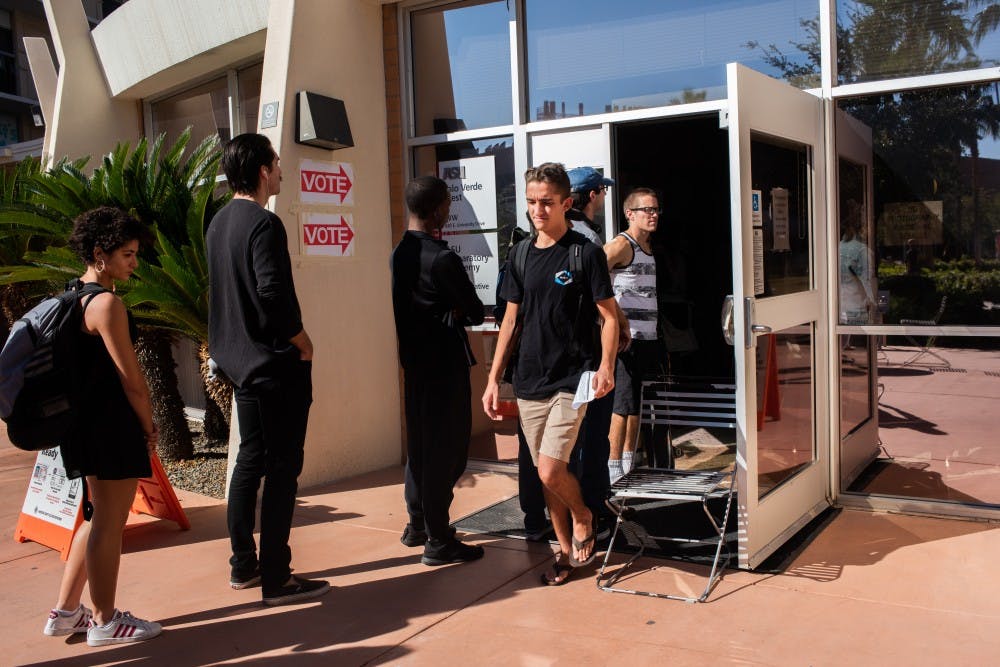Two weeks after the 2018 midterm elections, a belated wave of Democratic voters delivering key state-wide positions shook the political makeup of Arizona.
The late results came as an abnormally large amount of mail-in ballots were dropped off on election day 2018 compared to previous years.
While the late votes ate into initial Republican momentum, the GOP still holds control of both Arizona houses of the Legislature as well as the Governor’s office.
In the aftermath of the late electoral outcome, The State Press talked to an Arizona political analyst Stan Barnes, president of the Copper State Consulting Group, and Dave Wells, political science professor at ASU, about what has changed since the day after the election.
Read More: 5 takeaways from the 2018 midterm election
Belated blue wave reverses previous Republican victories
“The Democrats did not take a majority in either state house chamber, but the House will be 31-29, which is the closest it has been in 50 years,” Wells said. “That means if the Democrats hold together and one Republican joins them — they can stop legislation. That should be sufficient to block most purely ideological bills.”
In other key positions, Democrats claimed victories as thousands of previously uncounted votes rolled in.
“(Democrat) Katie Hobbs as Secretary of State may mean a number of issues will, at minimum, be discussed such as automatic voter registration and allowing independents to vote in the Presidential Preference Election, along with other means to make voting more accessible,” Wells said. “(Democrat) Kathy Hoffman as Superintendent of Public Instruction will make sure that charter school accountability and transparency stays in the spotlight."
Although most Republicans did eventually concede, some questioned the integrity of the electoral process. However, some say that strategy may work against them in the long run.
Unfounded voter fraud allegations threaten GOP brand
“From Donald Trump, Florida Republicans like Rick Scott and Marco Rubio and some Arizona Republicans there is a disturbing manner in which the term voting fraud is used without evidence,” Wells said. “Donald Trump made a ludicrous claim about Democrats changing shirts to vote multiple times in one interview.”
Other analysts point to the bad optics the situation presents.
"The GOP election fraud allegations and probe in Arizona are low on the values scale and high on the damage to reputation scale," Barnes said. "Absent any tangible evidence of allegations ... it just appears to me that the Republican Party is looking to find support, but I think absent any actual evidence it does damage to the brand."
One of the main components of the Republicans complaints is that voting procedures were not evenly applied between Maricopa and Pima county, a claim that was settled in court.
"Law should be evenly applied by all counties and the laws that exist should be applied in all circumstances," Barnes said. "But it feels, just as an observer, that there (are) allegations without anything to back them up and that doesn't help anyone."
Wells said that beyond the optics, Republicans are doing damage to the electoral process by undermining integrity without any tangible proof.
"Arizona Republicans did have a valid concern about different counties having different rules on 'curing' signatures on mail ballots — and that got resolved well by having all counties follow the same general procedure," Wells said. "It's very disturbing to see Republicans doing what the Russians tried to do in 2016 — undermine confidence in our election systems."
Democrats have a split future moving forward
There has been a growing ideological split within the Democratic party, with progressive candidates like Alexandria Ocasio-Cortez completing an upset win in New York against incumbent Democrat Joseph Crowley in the primary, and going on to become the youngest female Senator in history.
On the other side of the divide are candidates like the late-prevailing Senator-elect Kyrsten Sinema who straddles the ideological divide as a moderate leaning Democrat.
The warring factions of the Democratic party are both holding fast and analysts say the ideologically fissure will continue to deepen into the future.
"Sinema won by running as an Arizonan, not as a Democrat, and that's how Janet Napolitano won as well ... When you run as a liberal activist like David Garcia did, you get crushed," Barnes said.
Barnes said Democrats have two different paths to decide between.
“There are circumstances that lead to victory, and there are strategies that lead to defeat,” Barnes said. “There is the Sinema strategy versus the David Garcia strategy, and those strategies are instructive.”
Reach the reporter at isaac.windes@asu.edu or follow @isaacdwindes on Twitter.
Like The State Press on Facebook and follow @statepress on Twitter.




